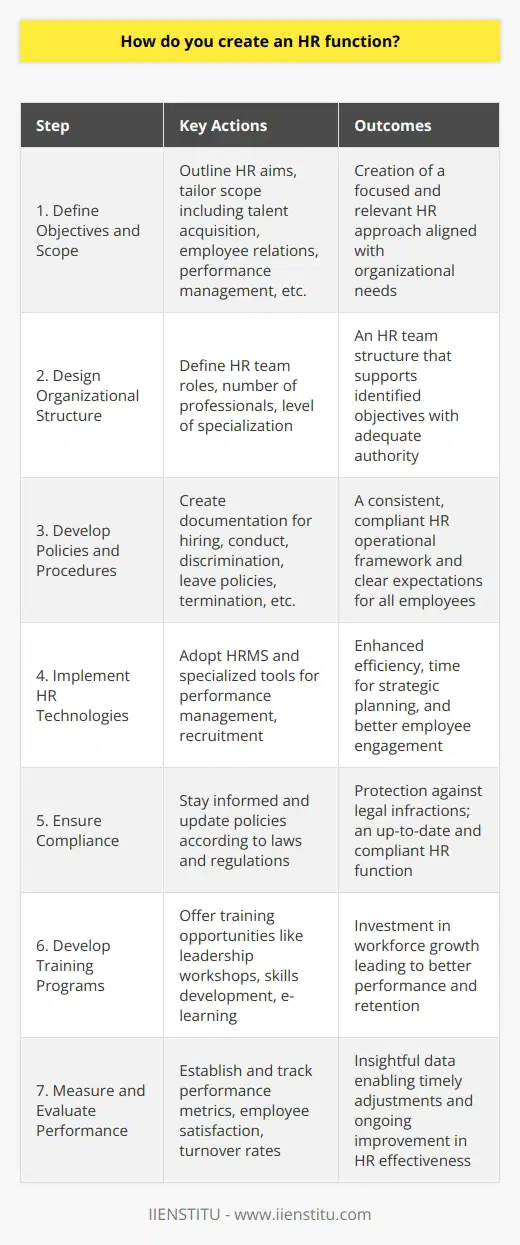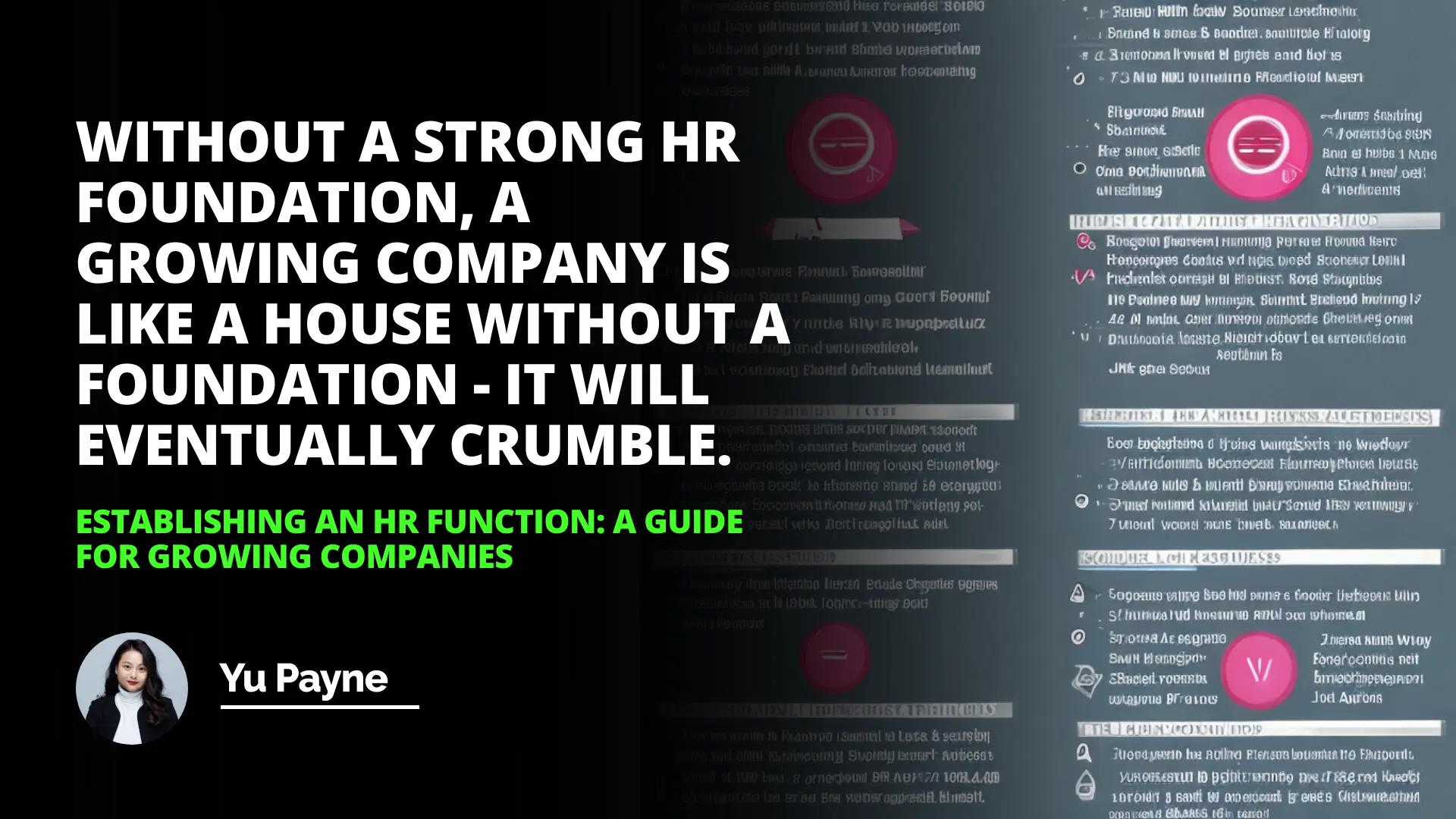
I still vividly recall that crisp autumn morning when our startup celebrated crossing the 50-employee threshold. It was more than just a number; it was a testament to the countless late nights, the relentless hustle, and the unwavering passion that fueled our journey. We decided to mark the occasion with an impromptu rooftop barbecue. As the sun dipped below the city skyline, casting a golden hue over the gathered crowd, laughter and chatter filled the air. The aroma of grilled delicacies mingled with the excitement of new possibilities. We were on top of the world—or so we thought.
But as the festivities wound down and I found myself staring out over the twinkling city lights, a nagging thought tugged at the back of my mind. Amidst the celebration, subtle cracks were beginning to show. Managers looked more exhausted than elated, whispered conversations hinted at brewing tensions, and our once-tight-knit team felt like it was starting to fray at the edges. It was like watching a beautiful tapestry slowly unraveling, thread by thread.
Recognizing the Growing Pains
Growing a business is a bit like raising a child. One moment you're celebrating their first steps, and the next, you're grappling with the challenges of adolescence. Our startup was no different. We had sprinted through the early stages, fueled by adrenaline and coffee, but as we grew, the complexities multiplied.
Consistency and Uniformity: Without a centralized HR, we noticed inconsistencies in how different departments handled hiring and employee relations. This led to confusion and, at times, feelings of unfairness among staff.
Managerial Overload: Our managers were wearing too many hats. They were juggling their projects while also trying to handle HR tasks, which wasn't sustainable.
Legal Compliance: Navigating the maze of employment laws was becoming increasingly complex. We needed experts to ensure we were compliant with regulations to avoid potential pitfalls.
Employee Development: We wanted our employees to grow with us. An HR team could provide the training and development opportunities they deserved.
Our managers, the backbone of our operations, were stretched thinner than a piece of taffy. They were juggling their core responsibilities while being pulled into:
Policy Development: Creating clear policies on recruitment, compensation, and performance management.
Recruitment Process: Streamlining how we attracted and selected new talent.
Employee Relations: Establishing channels for employees to voice concerns and provide feedback.
Training Programs: Implementing onboarding and continuous learning opportunities.
Recruitment processes they weren't trained for.
Salary negotiations that demanded expertise in market trends.
Performance evaluations without standardized criteria.
Navigating legal compliance with ever-changing employment laws.
It wasn't just unsustainable—it was a ticking time bomb.
The Aha Moment: We Need HR!
Skills and Experience: We developed comprehensive job descriptions and used structured interviews to assess candidates.
Personality Fit: We wanted team players who aligned with our company values. Incorporating behavioral assessments helped us gauge this.
Diversity and Inclusion: Embracing a diverse workforce brought in new perspectives and fostered innovation.
One particularly chaotic Monday, I found myself double-booked in meetings, sifting through a stack of resumes, and mediating a team dispute—all before lunch. By the time I spilled my second cup of coffee (oops!) and realized I'd missed an important client call, it hit me like a freight train: We needed help—professional help.
I remembered a conversation with my old college buddy, Mark, who had scaled his tech startup successfully. Over a casual beer, he'd mentioned, "You can’t build a skyscraper on a shaky foundation. HR isn't just about hiring and firing; it's about building that solid base." At the time, I brushed it off, but now his words resonated deeply.
Improved Morale: Employees felt heard and valued.
Enhanced Productivity: Managers could focus on driving the business forward.
Better Compliance: We navigated legal requirements more effectively.
"The HR Scorecard" by Brian E. Becker offers great insights into measuring HR's impact on business performance.
Research by the Society for Human Resource Management (SHRM) provides valuable resources on best practices.
Raising the Talent Bar: 4 Steps of Human Resources Management
HR Branding: An Examination of Its Importance in Business Strategy
Workplace Harassment: Effects, Legal Issues and Prevention Strategies
The Corporate HR Role: Maximizing Training Development Results
Reasons for Establishing an HR Function
Looking back, deciding to establish a dedicated HR team was one of the smartest moves we made. Here's why:
1- Consistency and Uniformity
Without a centralized HR function, our departments were like ships sailing in different directions. This led to:
Ulrich, D. (2012). HR from the Outside In: Six Competencies for the Future of Human Resources. McGraw-Hill Education.
Becker, B. E., Huselid, M. A., & Ulrich, D. (2001). The HR Scorecard: Linking People, Strategy, and Performance. Harvard Business Review Press.
Society for Human Resource Management (SHRM). (2021). HR's Strategic Partnership with Management. Retrieved from www.shrm.org
Inconsistent hiring practices.
Unequal employee benefits.
Misaligned performance metrics.
Our staff felt confused and, at times, unfairly treated. Implementing HR brought everyone onto the same page, fostering a sense of fairness and transparency.
2- Managerial Overload
Our managers were wearing too many hats, from project leads to ad-hoc HR representatives. This multitasking led to:
Without a strong HR foundation, a growing company is like a house. Without foundation - it will eventually crumble.
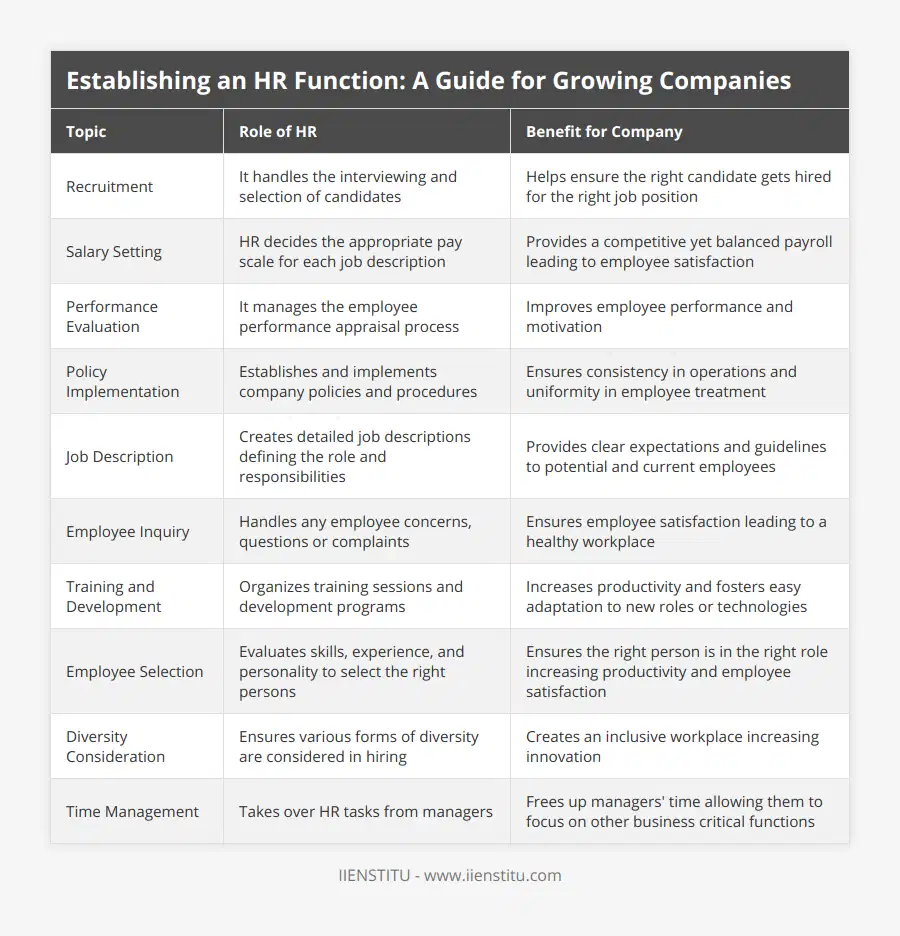
Burnout and decreased productivity.
Neglected core responsibilities.
Inefficient team management.
By delegating HR tasks to professionals, managers could focus on what they did best—driving projects and leading their teams.
3- Legal Compliance
Let's be honest, keeping up with employment laws is like trying to hit a moving target. We were constantly at risk of:
Unintentional labor violations.
Potential lawsuits.
Damaged company reputation.
An HR team ensured we stayed compliant, protecting both our employees and the company.
4- Employee Development
We wanted our employees to grow with us, but lacked the structure to support their development. HR could provide:
Training and professional growth opportunities.
Clear career progression paths.
Enhanced employee satisfaction and retention.
I recall diving into "Strategic Human Resource Management" by Michael Armstrong during this period. It was an eye-opener, illustrating how HR strategy aligns with business goals. This book became my go-to guide and I can't recommend it enough.
Laying the HR Foundation
Establishing an HR team wasn't just about hiring a few people; it was about strategically integrating HR into our company's fabric.
Initial HR Responsibilities
Our newly formed HR team focused on several key areas:
1- Policy Development
We needed clear, concise policies. HR helped us draft:
Employee handbooks.
Code of conduct guidelines.
Standard operating procedures.
2- Recruitment Process
Streamlining recruitment was paramount. HR introduced:
Structured interview frameworks.
Job description templates.
Onboarding programs.
3- Employee Relations
To foster open communication, HR established:
Feedback mechanisms.
Conflict resolution protocols.
Employee satisfaction surveys.
4- Training Programs
Investing in our team's growth, HR rolled out:
Skill development workshops.
Leadership training.
Mentorship opportunities.
Choosing the Right Employees
Selecting the right people to join our HR team was critical. We weren't just filling positions; we were building the pillars that would support our company's future.
Skills and Experience
We sought individuals who:
Had extensive HR knowledge.
Understood the nuances of startup culture.
Demonstrated proven success in previous roles.
Personality Fit
Equally important was ensuring they aligned with our company values. We wanted HR professionals who were:
Approachable and empathetic.
Innovative thinkers.
Passionate about employee development.
Bringing in Sarah, our HR director, was like finding the missing puzzle piece. With her infectious enthusiasm and wealth of experience, she quickly became an integral part of our leadership team.
Personal Reflections on the Impact of HR
Implementing an HR department transformed our company in ways I couldn't have imagined.
Improved Morale
Employees felt valued and heard. With HR facilitating open dialogues, we saw:
Increased job satisfaction.
Higher engagement levels.
A stronger sense of community.
Enhanced Productivity
Managers could re-focus on their primary roles, leading to:
1- More efficient project management.
2- Innovation and creativity flourishing.
3- Meeting (and often exceeding) company goals.
Better Compliance
With HR's guidance, we navigated the labyrinth of legal requirements smoothly. This resulted in:
Zero compliance-related incidents.
Enhanced company reputation.
Peace of mind for the leadership team.
The Unexpected Benefits
One surprising outcome was the improvement in internal mobility. Team members felt comfortable expressing interest in different roles within the company. To support this, HR provided reassignment request letter tips and information, making transitions seamless and transparent. This not only retained talent but also enriched our teams with diverse skill sets.
Lessons Learned
Reflecting on this journey, several key lessons stand out:
Don't Wait Too Long: We should've established HR sooner. The benefits far outweigh the costs.
Invest in the Right People: Hiring HR professionals who align with your culture is crucial.
Continuous Improvement: HR isn't set-it-and-forget-it. It requires ongoing evaluation and adaptation.
Encouraging Further Research
If you're considering a similar path, I recommend exploring:
"HR Transformation: Building Human Resources From the Outside In" by Dave Ulrich. It offers deep insights into modern HR practices.
"The Hard Thing About Hard Things" by Ben Horowitz. While not exclusively about HR, it provides valuable perspectives on building and managing startups.
Research articles from the *Journal of Human Resources Management*. They delve into advanced HR strategies and their impact on business success.
In Conclusion
Establishing a dedicated HR team was more than just a strategic move—it was a commitment to our people and our future. It laid the foundation for sustainable growth, ensuring that as we scaled, we did so ethically and effectively.
To anyone at a similar crossroads, contemplating the leap: don't hesitate. Investing in HR might just be the catalyst that propels your business to new heights. Remember, a company is only as strong as its people, and HR is the key to unlocking their full potential.
Final Thoughts
Sometimes, I marvel at how far we've come. From a handful of dreamers in a tiny office to a thriving company making waves in the industry—it’s been one heck of a ride. And while there were bumps along the way (and more than a few spilled coffees), I wouldn't trade these experiences for anything.
If you have questions, thoughts, or just want to swap startup stories, feel free to reach out. After all, we're all in this together, navigating the exhilarating and unpredictable world of business growth.
References
Armstrong, M. (2014). Strategic Human Resource Management. Kogan Page Publishers.
Ulrich, D. (2009). HR Transformation: Building Human Resources From the Outside In. McGraw-Hill Education.
Horowitz, B. (2014). The Hard Thing About Hard Things: Building a Business When There Are No Easy Answers. HarperBusiness.
Journal of Human Resources Management, Various Articles (2010-2020).
Without a strong HR foundation, a growing company is like a house without a foundation—it will eventually crumble. So, build that foundation strong, support your people, and watch your business not just grow, but thrive.
Frequently Asked Questions
What are the primary reasons for establishing an HR function in a growing company?
As a company grows, having a Human Resources (HR) function becomes increasingly important. HR helps to ensure that the organization is running smoothly and effectively and that the company can attract and retain top talent. This article will discuss the primary reasons for establishing an HR function in a growing company.
One of the primary reasons for establishing an HR function in a growing company is to ensure compliance with applicable laws and regulations. Companies need to comply with laws and regulations related to employment, such as the Fair Labor Standards Act and the Americans with Disabilities Act. An HR function can help ensure that the company meets its legal obligations and complies with all applicable laws and regulations.
Another important reason for establishing an HR function in a growing company is to ensure the company can attract and retain the best talent. An HR function can help to develop and implement a comprehensive recruiting strategy that allows the company to find and hire the most qualified individuals for the position. Additionally, the HR function can help to develop and implement adequate compensation and benefits packages that motivate and retain employees.
A third reason for establishing an HR function in a growing company is to ensure that the organization operates efficiently and effectively. An HR function can help to develop and implement policies and procedures that help to ensure the organization is operating as effectively and efficiently as possible. Additionally, an HR function can help ensure that the organization complies with applicable laws and regulations.
Finally, an HR function can help ensure that the organization can effectively manage and resolve any employee relations issues that may arise. For example, an HR function can help to develop and implement policies and procedures that address issues such as conflict resolution, grievance procedures, and performance management. Additionally, an HR function can help ensure that employee relations issues are handled promptly and effectively.
In conclusion, an HR function is essential to a growing company. An HR function can help ensure compliance with applicable laws and regulations, attract and retain top talent, and ensure that the organization operates efficiently and effectively. Additionally, an HR function can help ensure that any employee relations issues are managed and resolved effectively.
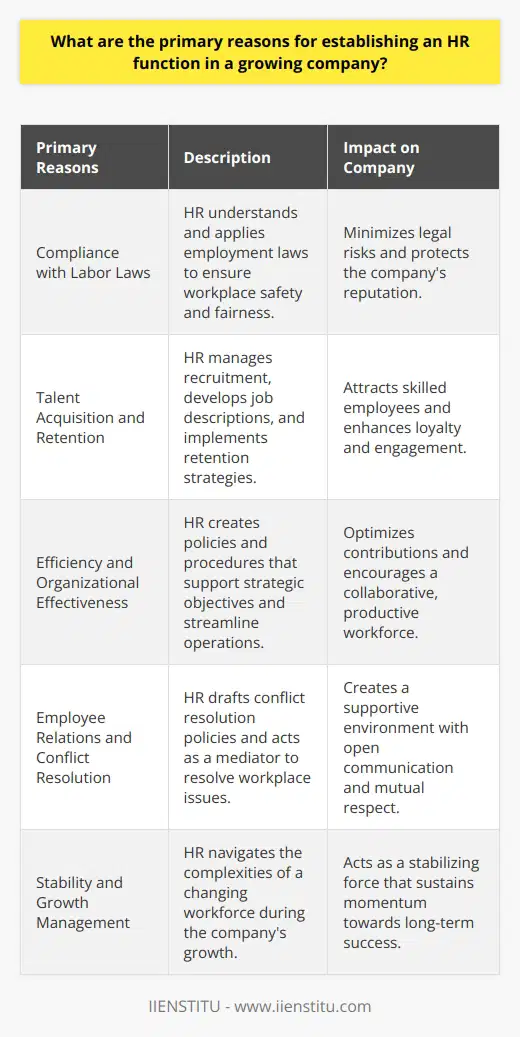
What are the initial HR responsibilities when setting up an HR function?
When setting up an HR function, several initial responsibilities must be addressed to ensure it is successful. These include creating job descriptions, recruiting and selecting staff, developing a compensation and benefits package, creating employee policies and procedures, and providing employee training and development.
Job descriptions are essential for ensuring that the right individuals are hired. They should include a detailed description of the position and the qualifications and experience required for the role. Recruiting and selecting staff for the HR function is also a crucial responsibility. Employers must ensure that they find and hire employees who have the necessary skills, experience, and qualifications to fulfill the role.
Once staff has been hired, employers must develop a compensation and benefits package that is competitive and attractive to potential employees. This should include base salaries and other perks such as health insurance, retirement benefits, and vacation time. Additionally, employers should create employee policies and procedures to ensure that the HR function runs smoothly and efficiently.
Employee training and development are integral in setting up an HR function. Training should be tailored to the organization's specific needs, including topics such as communication, conflict resolution, and legal compliance. Employee development should also be addressed, as it is essential to ensure that employees are kept up to date with the latest practices and trends in the industry.
In summary, setting up an HR function requires a lot of work, but it is essential to running a successful business. Therefore, employers must address the initial responsibilities outlined above to ensure that their HR function is effective and efficient.
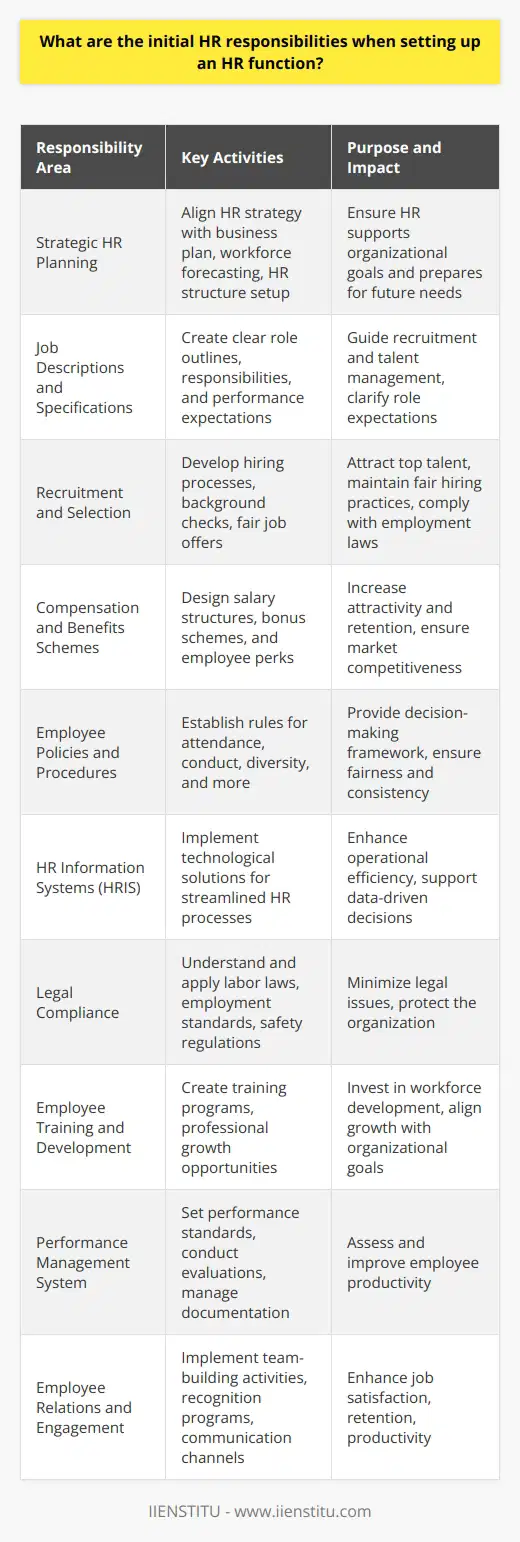
How can a growing company ensure they are choosing the right employees for their HR function?
When companies grow, the need for a human resources (HR) function becomes greater. Therefore, ensuring that the right people are chosen to fill these positions is essential. They will be responsible for various tasks such as recruiting, training, and managing employee relations. This article will provide insight into how a growing company can ensure they are selecting the right employees for their HR function.
One of the first steps a company should take when selecting its HR employees is to have a clear job description. This is important to ensure that the employee understands the job requirements and expectations and is suitable to handle the duties. Additionally, the company should clearly understand the skills, experience, and qualifications required for the role. This will make the hiring process more efficient and ensure that the right person is chosen for the job.
The company should also create a recruitment process tailored to the HR function's specific needs. This could include conducting interviews, background checks, and assessing the potential employees' skills and experience. The recruitment process should be designed to identify the most qualified candidate for the job and should also consider the company's cultural fit.
Finally, the company should consider the value that the HR staff can bring to the organization. This could include their knowledge of employment laws and regulations, their ability to manage complex employee relations, and their understanding of the company's goals and objectives. By considering the company's specific needs, the right people can be chosen to ensure that the HR function is adequate.
In conclusion, a growing company should ensure they choose the right employees for their HR function. This includes having a clear job description, creating a recruitment process tailored to the needs of the HR function, and considering the value the HR staff can bring to the organization. By following these steps, a company can be confident that they are selecting the best people for their HR roles.
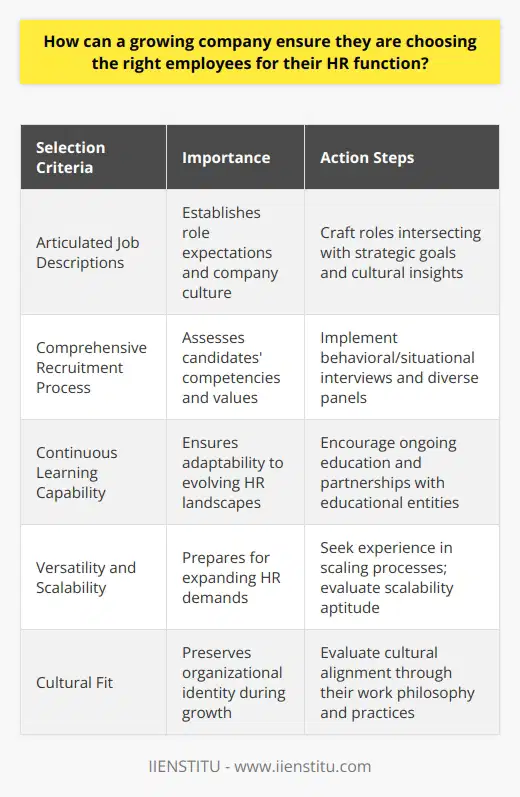
How can a growing company effectively integrate HR strategies to support their expansion goals?
HR Strategies in Growing Companies
Selecting a HR Strategy
To effectively integrate Human Resource (HR) strategies in support of a growing company's expansion goals, it is crucial to first select an appropriate HR strategy. The chosen strategy should align with a company's overall business objectives and ensure that the HR department is well-equipped to handle the increasing organizational complexities.
Expanding the Talent Pool
A key component of a successful HR strategy is broadening the talent pool of potential employees. Companies can explore various channels, like tapping into a global workforce or engaging freelance professionals, to maintain a steady stream of skilled personnel. This approach enables organizations to attract and retain the workforce necessary to meet their expansion goals.
Continuous Learning and Development
With the rapid expansion of a company, it becomes vital to invest in employee development to ensure a consistent level of expertise across the organization. Tailoring learning and development programs to suit employee needs can help businesses foster a culture of continuous improvement. Moreover, offering well-defined career paths and growth opportunities can lead to increased employee retention and support expansion initiatives.
Performance Management
Effective performance management strategies allow companies to identify and address employee performance gaps. Regularly setting measurable goals, providing feedback, and conducting objective performance appraisals help businesses to continually improve workforce capabilities. Thus, a robust performance management system can ensure the HR team consistently supports the company's expansion objectives.
Inclusive Workplace Culture
Establishing an inclusive workplace culture encourages employees to work collaboratively and embrace diverse perspectives. Fostering a supportive and diverse work environment can result in increased creativity and innovation, which can help propel the company towards its expansion goals. Additionally, prioritizing employee well-being and work-life balance contributes to increased job satisfaction and company loyalty.
Leveraging HR Analytics
Lastly, leveraging HR analytics can provide valuable insights to guide HR strategies and workforce planning. By analyzing data on employee performance, attrition rates, and other relevant metrics, companies can make evidence-based decisions to fine-tune their HR approaches. Consequently, businesses can ensure that their HR strategies effectively support their expansion goals.
In conclusion, a growing company can effectively integrate HR strategies to support their expansion goals by selecting an appropriate HR strategy and focusing on talent acquisition, employee development, performance management, inclusive workplace culture, and leveraging HR analytics. Implementing these steps can enable organizations to sustain their growth targets while maintaining a robust and skilled workforce.
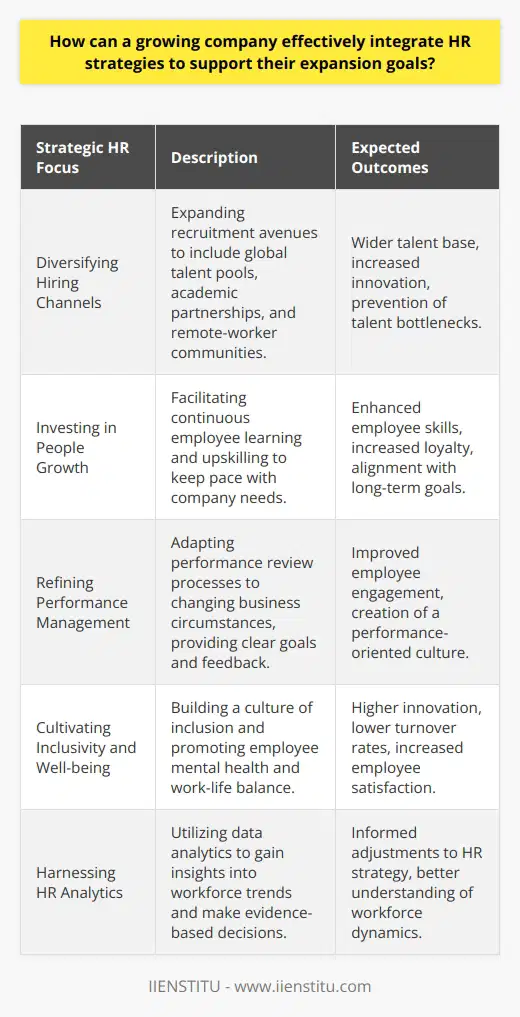
What are the key components to consider when establishing a scalable HR function for a growing organization?
Organizational Structure and Roles
One of the key components to consider when establishing a scalable HR function for a growing organization is developing a well-defined organizational structure and clearly identifying roles and responsibilities. This allows for efficient delegation of tasks and establishes clear lines of authority and communication, enabling the HR team to operate effectively and respond to the organization's needs more quickly.
Effective Processes and Systems
Another crucial element in fostering a scalable HR function is implementing efficient processes and systems, which can help manage and organize HR tasks - such as recruitment, onboarding, training, payroll, and performance management. The use of HR technology, such as applicant tracking systems and HR management software, can enable the HR team to keep up with growth, streamlining tasks, minimizing file errors, and allowing HR professionals to focus on more strategic tasks.
Training and Development
In order to ensure long-term success and adaptability, organizations must invest in the ongoing training and development of their HR teams. This includes equipping HR professionals with the latest industry knowledge, best practice guidelines, and relevant skills. Addressing the professional development needs of the HR team promotes continuous improvement and ensures adaptability to the evolving needs of the organization, keeping the HR function scalable amid growth.
Alignment to Business Strategy
When establishing a scalable HR function, organizations must take care to align their HR strategy with their overall business strategy. This ensures that HR is not only responding to current needs but also anticipating future needs, making the HR function adaptable to the changes in the organization's business environment. By setting objectives aligned with and directly supporting business goals, HR can become a strategic partner in the organization's growth efforts.
Collaboration and Communication
Finally, fostering a culture of collaboration and effective communication is essential for a scalable HR function. Regular meetings and feedback loops among HR team members, as well as open communication with internal stakeholders, promote a sense of transparency and trust. By establishing clear communication channels and expectations about how decisions are made and information is shared, organizations can create a scalable HR function that is flexible, adaptable, and well-prepared to meet the challenges of growth.
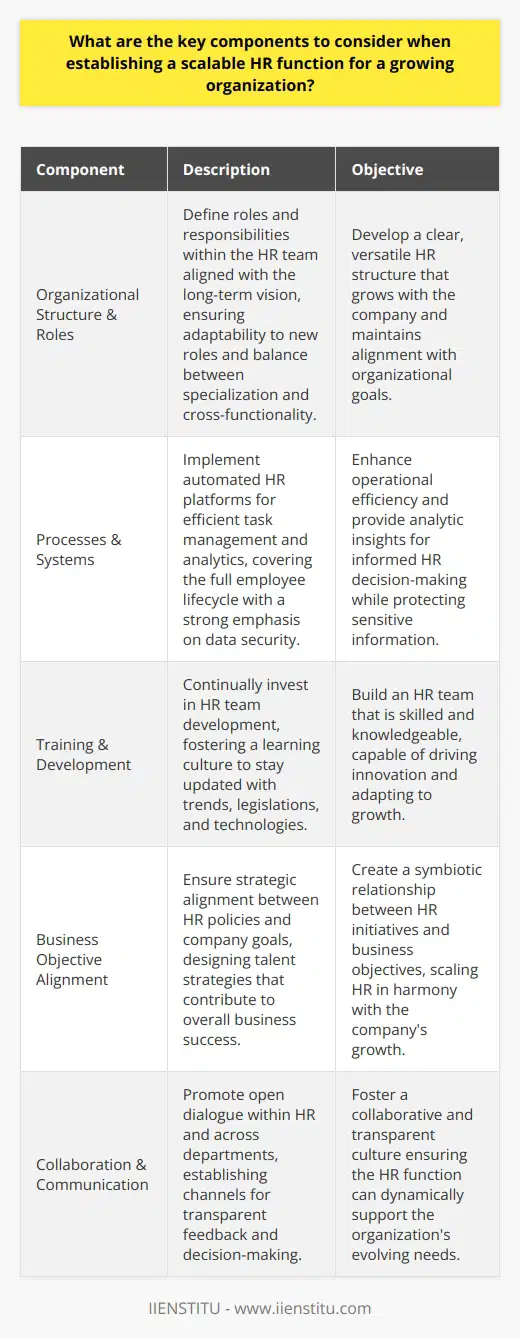
How can a company assess and continuously improve the performance of its HR department to ensure alignment with business growth objectives?
Assessing HR Performance Metrics
To assess the performance of its Human Resources (HR) department, a company can employ various key performance indicators (KPIs) that align with its overall business growth objectives. These KPIs include metrics such as employee turnover rate, cost per hire, and employee engagement rates. Evaluating these metrics can provide an informed analysis of the HR department's effectiveness in attracting and retaining talent that will contribute to the organization's success.
Continuous Improvement through Feedback
To continuously improve HR performance, a company should implement regular feedback mechanisms for employees and management. Surveys, performance reviews, and exit interviews can offer valuable insights into HR department areas that require enhancement. By collecting and analyzing feedback data, the organization can identify the strengths and weaknesses of its HR processes, which can inform targeted strategies for improvement.
Benchmarking against Industry Standards
Another way to assess and improve the HR performance is to benchmark against industry standards and best practices. Industry benchmarking can assist a company in identifying gaps in its HR practices compared to competitors or similar organizations. This approach enables a company to adopt innovative methodologies and technologies to promote efficiency and optimize performance. Ultimately, this contributes to the achievement of business growth objectives.
Aligning HR Strategy with Business Objectives
To ensure their growth objectives are met, the company must also align HR strategy with these objectives. This alignment requires regular evaluation and re-evaluation of the HR department's goals to establish their correlation with overall business strategy. This alignment ensures the HR department focuses its efforts on supporting sustainable growth through proficient talent management, effective training, and employee development programs.
In conclusion, assessing and continuously improving the performance of an HR department requires an organization to employ KPIs, gather regular feedback, benchmark against industry standards, and ensure its strategy aligns with business growth objectives. By implementing these practices, an organization can ensure its HR department effectively contributes to achieving its overall goals.
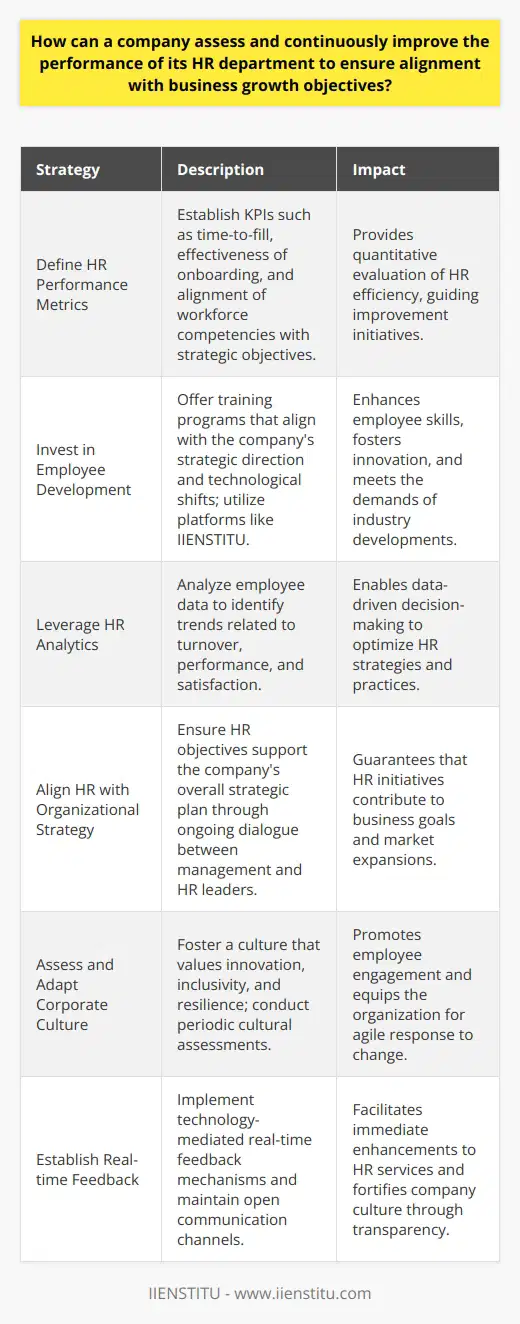
How do you structure your HR department as your company grows?
Assessing HR Needs
As a company grows, structuring the Human Resources (HR) department becomes crucial for managing employee-related processes and ensuring long-term success. The first step in achieving this lies in carefully assessing the HR needs of the organization. Factors to consider include the size of the workforce, specific industry requirements, and the company's future growth plans.
Creating a Solid HR Foundation
A solid HR foundation typically consists of three core components: clear HR policies and procedures, the establishment of a well-defined organizational hierarchy, and constant communication with employees. Developing and implementing comprehensive policies and protocols ensures that employee-related issues are addressed consistently across the organization. Furthermore, a clear organizational structure with distinct roles and responsibilities fosters accountability and helps establish expectations and performance standards for each employee.
Addressing Talent Management
Effective talent management is essential to support the growth of the company. This involves proactive recruitment strategies to attract and retain top-quality candidates, offering competitive compensation packages, and creating opportunities for learning and professional development. Structuring the HR department to accommodate these aspects will help promote a high-performance culture, ultimately contributing to the company's competitiveness and success.
Implementing Technology Solutions
Embracing technology in the HR department streamlines processes and enables more efficient data and document management. Incorporating HR software solutions can automate functions such as applicant tracking, time and attendance, and performance management. Additionally, investing in virtual collaboration tools encourages information sharing and team collaboration, improving overall employee productivity and engagement.
Prioritizing Employee Retention and Satisfaction
Employee turnover can have a significant impact on a growing company, making retention and satisfaction a top priority for the HR department. This requires developing a thorough understanding of employee needs and expectations to inform HR initiatives. Frequent employee satisfaction surveys and open channels for feedback foster an environment where employees feel valued and motivated, supporting the organization's longer-term success.
In conclusion, structuring the HR department as the company grows is a continuous process that involves assessing HR needs, creating a solid foundation, addressing talent management, implementing technology solutions, and prioritizing employee retention and satisfaction. By focusing on these areas, organizations can build an effective HR department that drives sustainable growth and success.
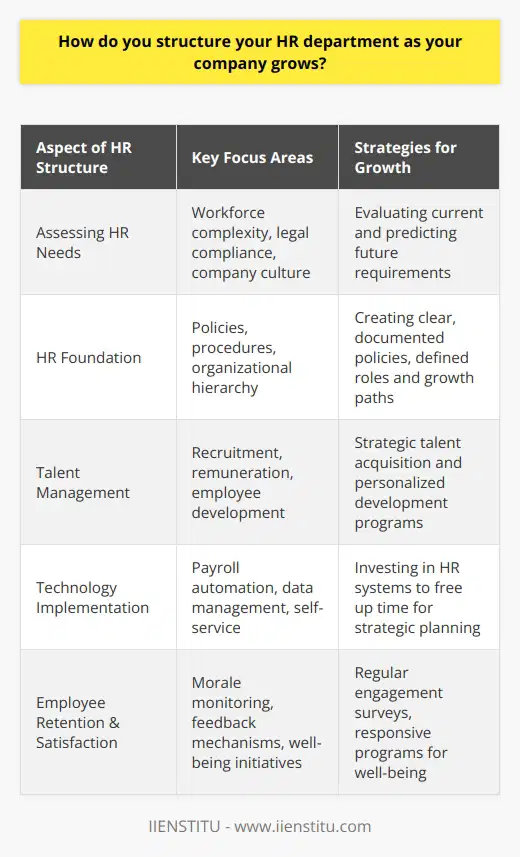
What is the role of HR in growing a company?
Role of HR in Business Expansion
Talent Acquisition:
One of the primary roles of Human Resources (HR) in growing a company is talent acquisition. HR professionals are responsible for identifying, attracting, and recruiting qualified individuals to fill job vacancies, thereby ensuring that the organization has the right employees to drive business growth and compete effectively in the market.
Employee Training and Development:
HR plays a pivotal role in employee training and development. By creating and implementing effective training programs, HR ensures that employees possess the necessary skills, knowledge, and abilities to contribute to the company's growth. These programs help employees improve their job performance, which ultimately results in increased productivity, efficiency, and competitive advantage.
Organizational Culture and Employee Engagement:
A healthy organizational culture and high levels of employee engagement are essential for business expansion. HR is responsible for fostering a positive work environment and promoting employee satisfaction by designing and implementing various policies, procedures, and initiatives. By reinforcing company values, encouraging open communication, and recognizing employee contributions, HR helps create a cohesive and motivated workforce capable of driving company growth.
Retention Strategy:
Employee retention is vital for a company seeking to grow, as high employee turnover can result in increased recruitment and training costs. HR plays a crucial role in designing and executing effective retention strategies that focus on employee satisfaction, competitive compensation packages, and career development opportunities. By retaining valuable employees, HR ensures continuity and stability, allowing the company to maintain and expand its business operations.
Change Management:
Companies looking to grow often face change, which can be challenging for employees to adapt. HR is responsible for managing change effectively by developing and implementing change management strategies that facilitate smooth transitions and minimize disruption. These strategies may include communication plans, training, and support to help employees understand and embrace change, enabling the company to achieve its growth goals.
In conclusion, the role of HR in growing a company is multifaceted, encompassing talent acquisition, employee training and development, organizational culture and engagement, retention strategy, and change management. These functions work together to create a capable workforce and a conducive work environment that allows for continued expansion and success in a competitive business landscape.
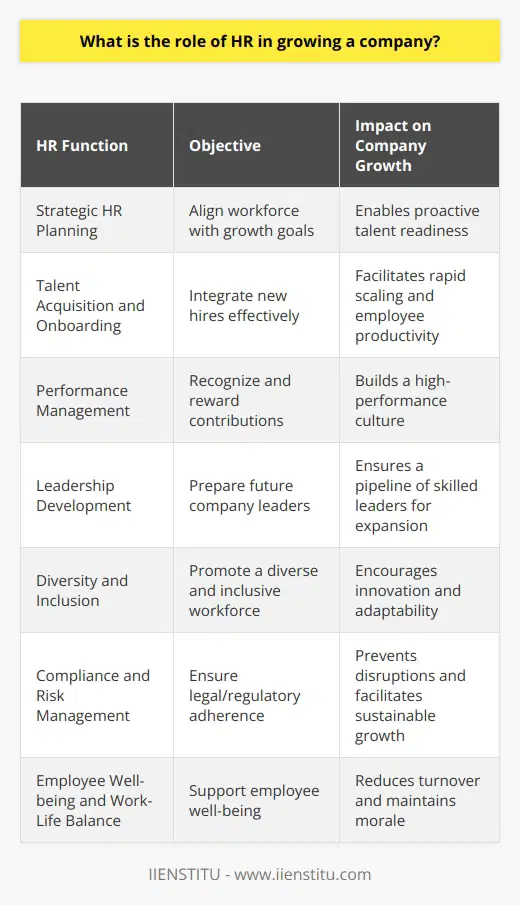
How do you create an HR function?
Establishing an HR Function
Define Objectives and Scope
To create an effective human resources (HR) function, first identify its objectives and scope. These may include talent acquisition, employee relations, regulatory compliance, and performance management. Establishing clear goals allows the HR function to align with the organization's mission and values.
Design Organizational Structure
Next, design an organizational structure that supports the HR function's objectives. This involves determining the number of HR personnel required and defining their roles and responsibilities. Ensure that the HR team has a clear reporting structure and is integrated into the organization's overall structure.
Develop Policies and Procedures
An essential element of creating an HR function is developing comprehensive policies and procedures. These guidelines should address various aspects of HR, such as recruitment, onboarding, training and development, performance appraisal, and employee engagement. Written documentation ensures consistency in HR practices and reduces the risk of legal issues.
Implement HR Technologies
Leveraging HR technologies is crucial in streamlining and automating many HR processes. Invest in human resource management systems (HRMS) to efficiently manage employee data, recruitment, performance management, and learning and development. HR technologies enable the HR function to focus on strategic initiatives and improve the overall employee experience.
Ensure Compliance with Laws and Regulations
One of the HR function's primary responsibilities is to ensure compliance with relevant employment laws and regulations. This involves developing a thorough understanding of local, state, and federal employment laws, monitoring changes in legislation, and updating HR policies and practices accordingly.
Develop and Implement Training Programs
To support employees in their growth and development, the HR function must create and implement comprehensive training and development opportunities. This includes developing a training calendar, identifying learning needs, and organizing internal and external training sessions. Offering professional development opportunities contributes to employee satisfaction, retention, and motivation.
Measure and Evaluate Performance
Finally, measure the HR function's performance using data-driven metrics and key performance indicators (KPIs) to assess its effectiveness in achieving its objectives. Regularly evaluate the HR function's performance and adjust strategies or practices as necessary to ensure they align with the organization's overall goals.
In conclusion, creating an HR function involves defining objectives, designing an organizational structure, developing policies and procedures, implementing HR technologies, ensuring compliance, developing training programs, and measuring performance. These steps are essential in establishing an HR function that successfully addresses the organization's human resource needs and contributes to its strategic goals.
